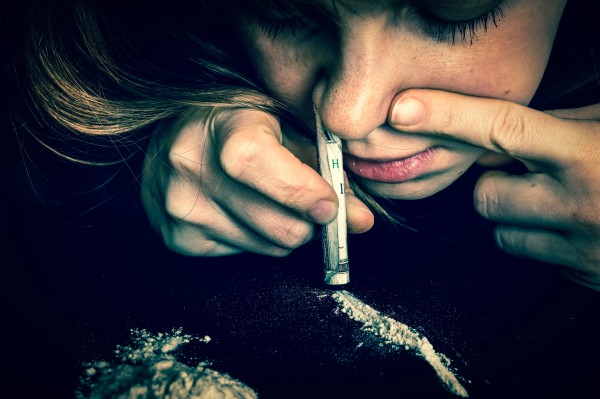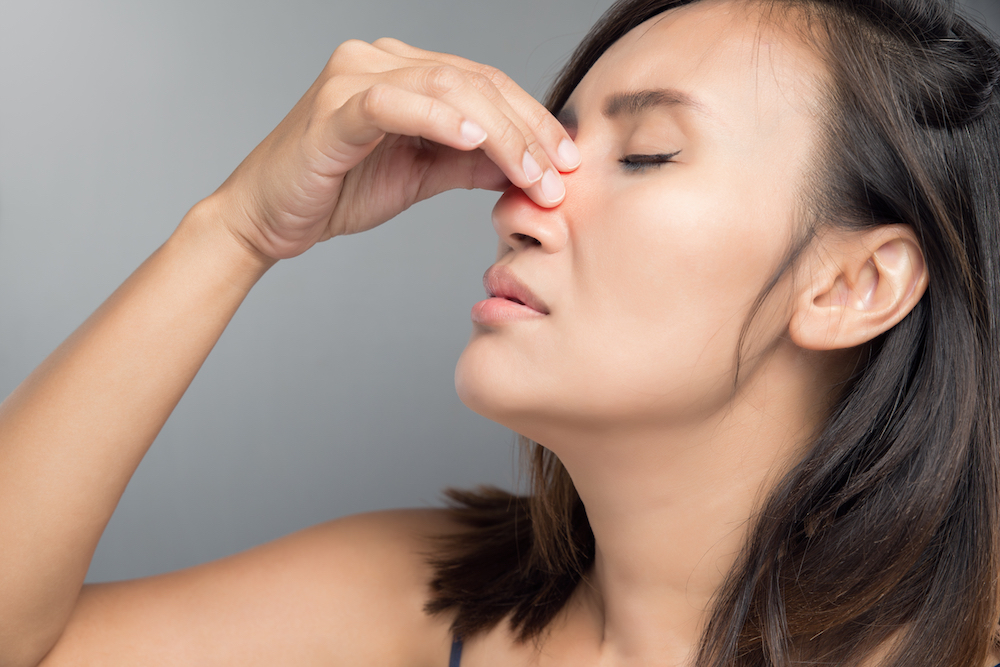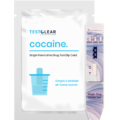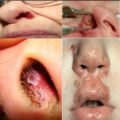Because the mucosa inside the nose is easily accessible, and provides rapid absorption of drugs introduced to it in powdered, liquid, or aerosol form, it offers many advantages as a drug delivery system. By bypassing the stomach and liver, where drugs may be degraded by digestive processes before being absorbed into the bloodstream, insufflation, or snorting, drugs provides a quick onset of effects.
Intranasal administration is an effective option for the delivery of many therapeutic drugs. It’s noninvasive, virtually painless, and easy for patients or doctors to administer. It is especially well suited for delivering medication to children who may fear needles or have trouble swallowing pills or tablets. Because of these reasons, snorting drugs is also a preferred method of ingestion for those who use drugs recreationally. But long-term use of drugs via insufflation can lead to significant, permanent damage to the nose.
Cocaine is a stimulant originally harvested from the Coca plant in countries like Peru and Bolivia. It can be ingested in many ways, but the most common is snorting a powdered form. Injection and smoking crack are also common, but their more invasive and involved nature leads to snorting being more popular. Small amounts of cocaine are called “bumps”, which are commonly snorted off keys or long finger nails. Larger amounts of cocaine are usually arranged into straight lines to be snorted, usually through a straw shaped implement, often a rolled up bill. These doses are usually referred to as “lines” or “rails.”
Why Do People Snort Cocaine?
Snorting cocaine is not the fastest way to absorb it and feel the high. Though it’s not as fast as smoking or injecting, the drug’s effects can be felt for longer when it’s snorted. In order for the cocaine to take hold, it must enter the bloodstream and flow to your brain. As you inhale the cocaine, it coats the soft tissues in the nose and gets absorbed into the blood stream. To make it to the brain, the cocaine flows in the blood it’s been absorbed into, first traveling to the lungs. The lungs incorporate oxygen into the blood and send it to the heart to be pumped to the brain and the rest of the body.
Once in the brain, cocaine binds to certain receptors and guarantees that dopamine (the feel-good chemical) isn’t being removed as it normally would be. The body naturally creates dopamine when you engage in activities it enjoys like getting exercise, eating food, and having sex. The end stages of your body’s use of dopamine include specialized proteins which remove it from your brain’s receptors in order to recycle it. Using cocaine essentially blocks those recycling proteins from accessing the dopamine, causing its effects to continue. This interaction creates the “euphoric” effect cocaine exhibits upon use. The way the body processes cocaine may seem complicated, but it only takes minutes to fully absorb the drug and feel its effects. SEE:How Long Does Crack Cocaine Stay in Your System
Cocaine Effects on the Nose
Cocaine nose damage is a common result of snorting the drug. A “cocaine nose-job” is the medical process of repairing a deviated septum that was caused by regular intranasal use of the substance.
A common question asked is “What does cocaine do to your nose?” There are numerous physical effects that snorting cocaine can have on this part of a person’s body. Aside from a loss of smell, snorting cocaine can lead to a nasal collapse, sinus issues or nose bleeds. If someone you know has shown any of these signs, they might be regularly snorting cocaine. If so, they should seek medical attention both due to immediate health risks and their long-term future. Snorting cocaine is not only harmful to a person’s nose but can also lead to addiction.
Cocaine Nose Bleed
Cocaine nose bleeds are a common side effect of constant cocaine use. When the drug enters the body intranasally, the substance comes into contact and irritates the inner part of the nose, where there’s a thin layer of skin and a heavy blood supply. Cocaine also enters the bloodstream through the mucous membrane, which also becomes irritated as cocaine causes the blood vessels to constrict. The constant interaction between cocaine and the interior of a person’s nose can result in decaying cartilage and skin, which causes an even greater potential for nose bleeds due to a thinner layer of skin preventing blood from leaving the body.
If someone you know often suffers from nosebleeds and exhibits other signs of cocaine addiction, they might be using cocaine regularly. Dry air also can result in random nose bleeds, so understanding other effects of regular cocaine use can help someone determine if a loved one is at risk.
Cocaine Nose Collapse
Snorting cocaine regularly can negatively impact a person’s nose because the drug constricts blood vessels and limits the blood flow to the septum. When blood supply is limited, less oxygen is delivered to the septum and the lining begins to die, which can then cause the cartilage to die and perforations (holes) to form. When perforations form, a cocaine nose collapse can occur since the septum cartilage is what supports a person’s nose. A septal perforation will not heal on its own. Therefore, using cocaine intranasally can cause permanent nasal damage or result in surgery.
Cocaine and Sinus Problems
In addition to a nose collapse, snorting cocaine also can cause sinus problems to form. Blood vessels are shrunk due to the drug’s presence, the mucous membrane becomes irritated and inflamed. When this happens, runny noses, sneezing and even sinus infections can occur. Nose bleeds are another effect of the mucous membrane becoming irritated by the intranasal use of the popular stimulant. The combination of bleeding out the nose and regular sinus problems are a sign that someone might be snorting cocaine.
How To Stop Your Nose From Running After Doing Coke
The nose is a complex and important part of our body. It’s home to 400 different types of receptors responsible for distinguishing smells, and humans can tell the difference between 1 trillion different scents. The nose also helps us taste food and, to some extent, it filters the air we breathe. As air comes in through the nostrils, it flows past small hairs and mucus membranes which act together to catch and lock down particles like dust and dirt that don’t belong in the lungs. Here is how to stop your nose from running after doing coke:
- Drink plenty of fluids
Drinking fluids and staying hydrated when dealing with a runny nose can be helpful if you also have symptoms of nasal congestion. This ensures that mucus in your sinuses thins out to a runny consistency and is easy for you to expel. Otherwise, it may be thick and sticky, which congests the nose even further.
Avoid beverages that dehydrate rather than hydrate. This includes drinks like coffee and alcoholic beverages.
- Hot teas
On the other hand, hot beverages like tea may sometimes be more helpful than cold ones. This is because of their heat and steam, which help open and decongest airways. Certain herbal teas may contain herbs that are mild decongestants. Look for teas that contain anti-inflammatory and antihistamine herbs, such as chamomile, ginger, mint, or nettle.
Make a cup of hot herbal tea (preferably non-caffeinated) and inhale the steam before drinking. Sore throats often accompany runny noses — drinking hot herbal tea can help soothe a sore throat, too.
- Facial steam
Inhaling hot steam has been shown to help treat a runny nose. A 2015 study of people with the common cold proved that using steam inhalation was quite effective. It reduced illness recovery time by about one week compared to no steam inhalation at all.
In addition to inhaling steam from a hot cup of tea, try a facial steam. Here’s how:
- Heat clean water in a clean pot on your stove. Heat it just enough so that steam is created —DON’T let it get to a boil.
- Place your face above the steam for 20 to 30 minutes at a time. Take deep breaths through your nose. Take breaks if your face gets too hot.
- Blow your nose afterward to get rid of mucus.
If desired, add a few drops of decongestant essential oils to your facial steam water. About two drops per ounce of water is sufficient.
Eucalyptus, peppermint, pine, rosemary, sage, spearmint, tea tree (melaleuca), and thyme oils are great options. Compounds in these plants (like menthol and thymol) are also found in many over-the-counter decongestants.
If you don’t have these essential oils, use these herbs in dried form instead. Make your facial steam into an herbal tea and inhale the vapors — you’ll get the same benefits.
- Hot shower
Need some quick relief? Try a hot shower. Just like a hot tea or facial steam, a shower’s spray can help alleviate a runny and stuffy nose. Place your face and sinuses directly in the steam and spray of the shower for best results.
- Neti pot
Using a neti pot for nasal irrigation (also called nasal lavage) is a common approach to sinus issues. This includes runny nose problems and discomfort. Neti pots are small teapot-like containers with a spout. You add a warm saline or saltwater solution to the pot. You then use the pot to pour the solution through one nostril and out the other. This rinses out your sinuses quite thoroughly.
Purchase a neti pot kit at your local pharmacy, store, or online. Make sure to follow directions for your neti pot exactly. Improper use of neti pots can, though rarely, make runny noses worse or cause sinus infections. Make sure to use sterile and distilled water rather than tap water.
None of these remedies are designed to actually cure or completely get rid of the underlying causes of runny noses (inhaling coke)
Treatment for cocaine: where to start
You can go to see a GP, who can refer you for treatment. Or, if you prefer, you can refer yourself directly to your local drug treatment service. At your first appointment you’ll be asked lots of questions about your health and drug use. This is so a tailored treatment plan can be put together for you. You’ll be given a key worker who will support you throughout your treatment plan.
Which treatments work for cocaine addiction?
Treatments that are known to be effective for cocaine addiction include:
- Talking therapies – therapies like cognitive behavioural therapy (CBT) help you to understand your addiction and to change your thoughts and behaviour. This will either be as part of a group or one to one with a specialist drugs counsellor or therapist.
- Couples therapy – you may be offered this if you have a partner who does not use cocaine.
- Incentives – you may be offered rewards, such as vouchers, for sticking with your treatment and for staying off cocaine when it finishes.
Unlike treatment for heroin, there are no medicines that work as substitutes for powder cocaine, crack cocaine and other stimulants.
However, you may be offered medicines to help with related symptoms, such as sleep problems. These are often used on a short-term basis because long-term use of medicines that can help you sleep can also be addictive in itself. If you’re addicted to alcohol as well as cocaine, you may be prescribed Antabuse (disulfiram).
Other help for cocaine addiction
Some people find mutual support groups, such as Narcotics Anonymous useful. These are based on the same 12-step principles as Alcoholics Anonymous.
SMART Recovery is an alternative science-based programme that helps people recover from addictions.
Cocaine Anonymous offers a recovery solution for anyone who has a problem with drug or alcohol misuse. They use the proven 12-step recovery programme.
Some cocaine users also have problems with alcohol or cannabis. If you’re also addicted to these or any other substances, you should be offered specialized help with this too.
Are you or a loved one suffering from an addiction to cocaine? Don’t hesitate to reach out and ask for help today. Professional help is available and ready to help you on the road to recovery.
This Information is provided for Harm reduction and Informational purposes only Public Health Nigeria does not support any form of substance abuse.







